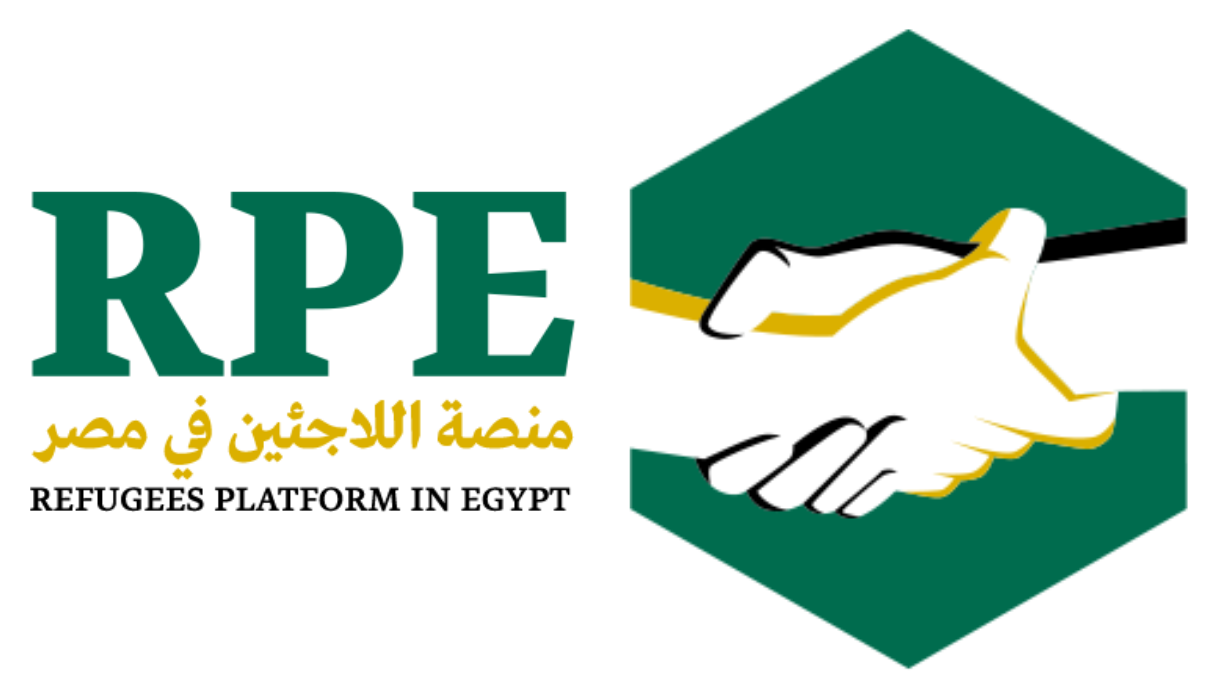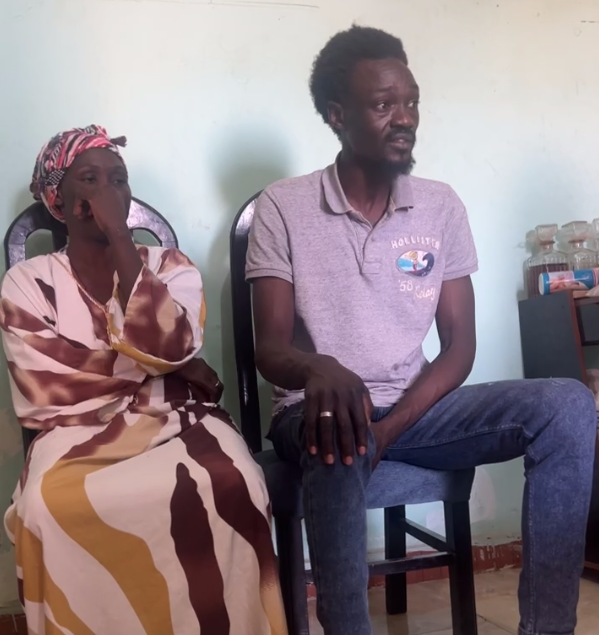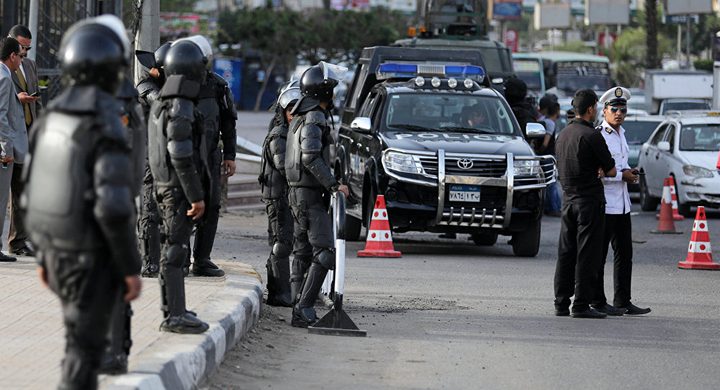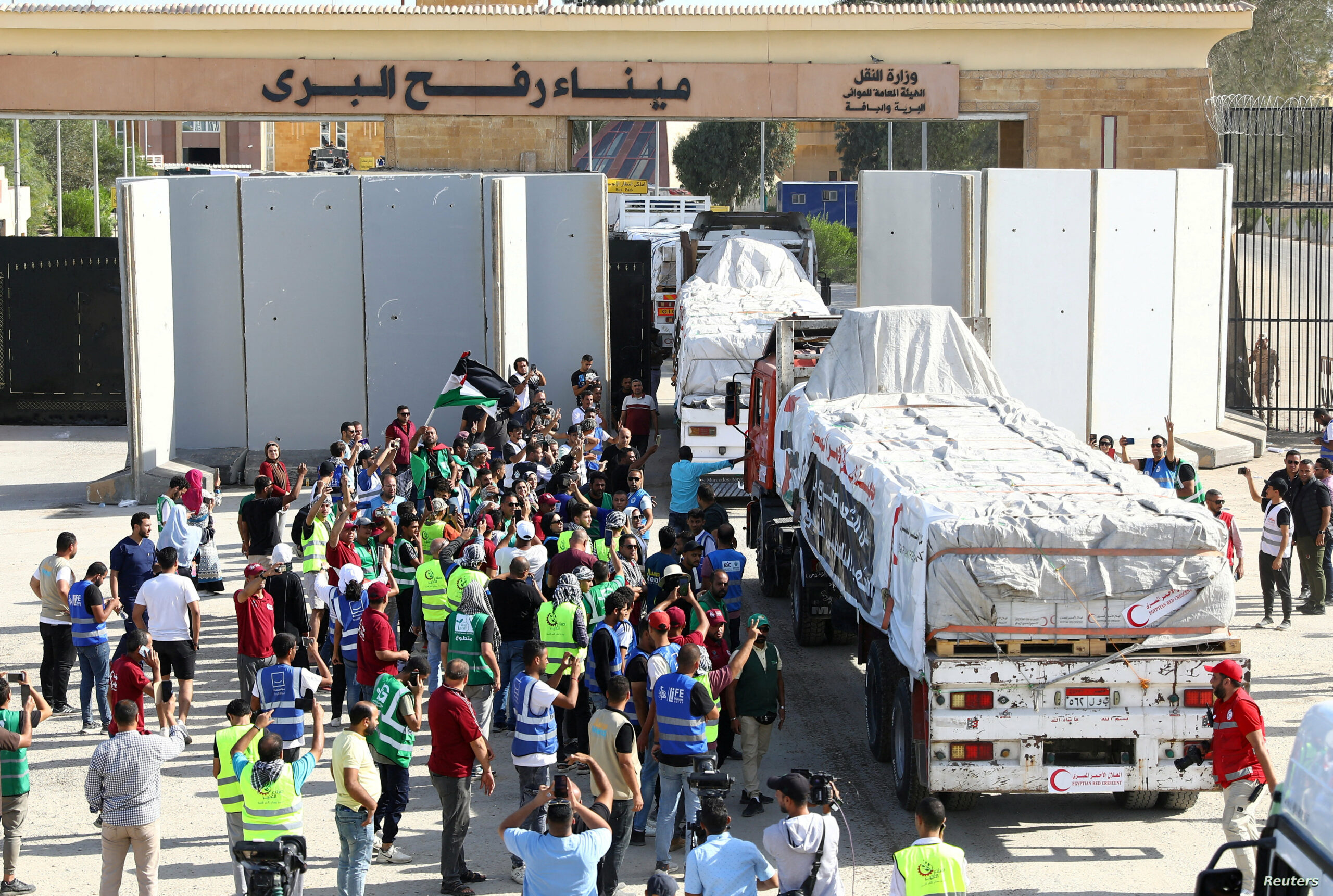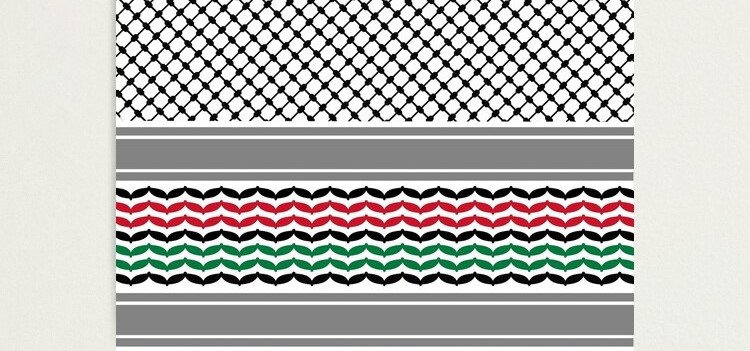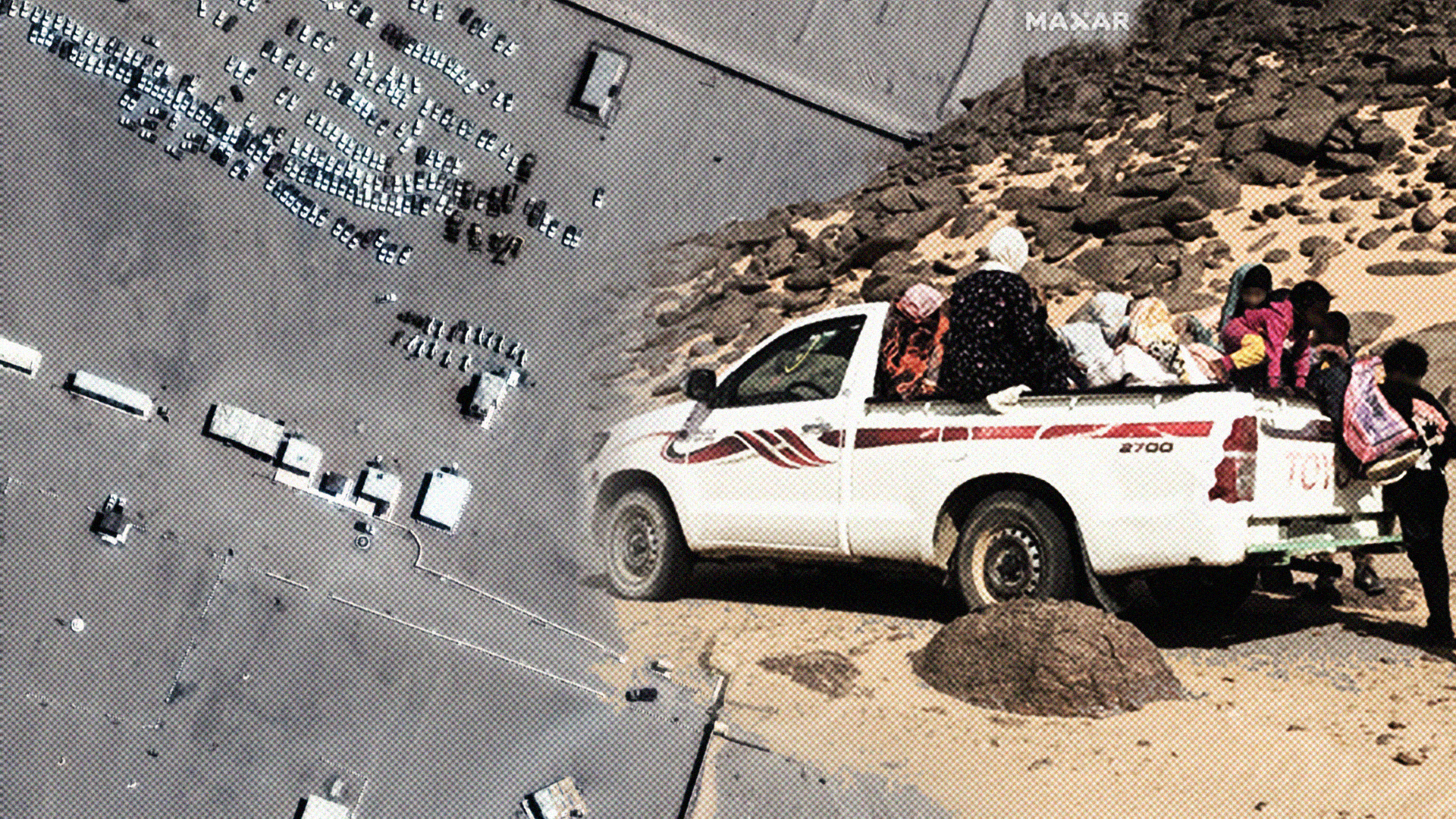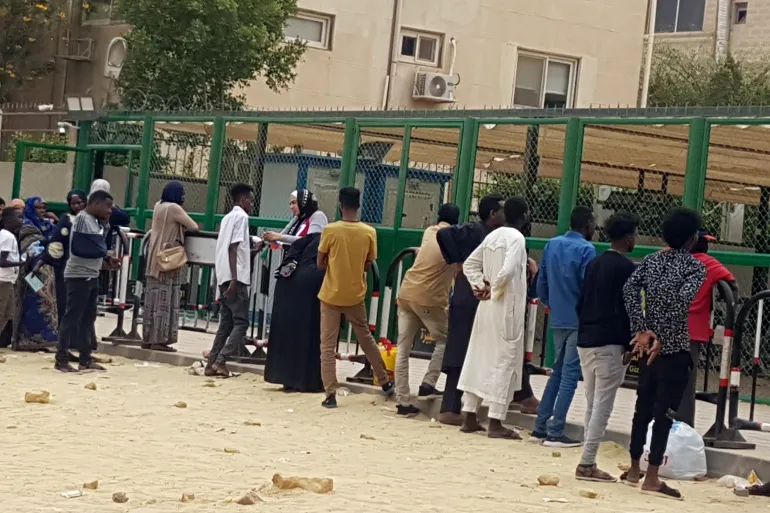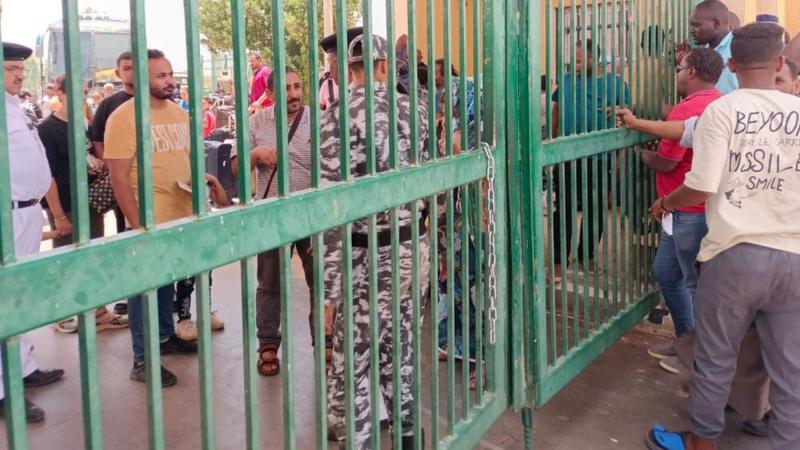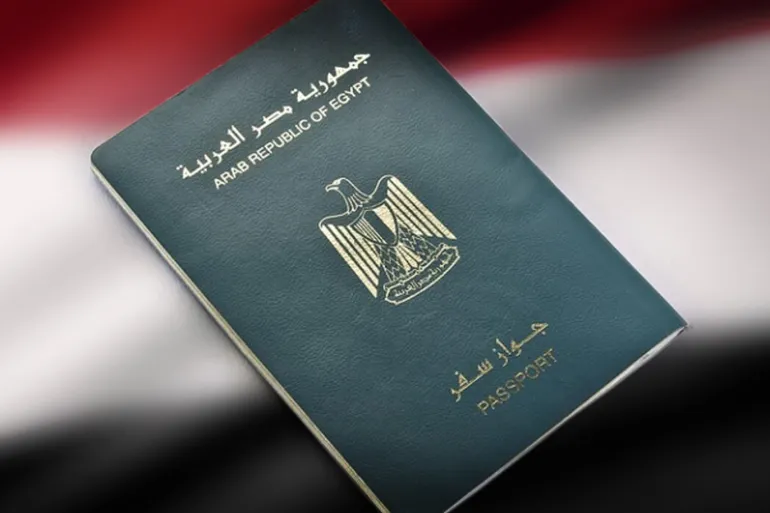The report was prepared based on various testimonies from travelers. The Refugees Platform in Egypt’s team edited the report and verified the information from various sources at the border crossing.
*The names used in the report are aliases*
On April 25th, the Egyptian government issued a decision prohibiting the passage of individuals carrying temporary travel documents, which was allowed before and after the forced displacement of thousands of people affected by the armed conflict in Sudan. The temporary documents acted as an alternative to Sudanese passports in case of their loss, allowing women of all ages, men over fifty, and those under sixteen to cross the borders. The Egyptian government had also allowed the crossing of individuals with renewed passports, while passport extensions and temporary documents were issued through the Sudanese authorities.
The sudden decision affected the crossing movement of many displaced individuals, including women, children, the elderly, and particularly patients and those with urgent medical appointments or surgeries, resulting in an inhumane condition with many deaths occurring and women giving birth at the border crossing. Thousands of individuals remain stranded in dire conditions, torn between the danger of fleeing the war, the collapse of the healthcare system, lack of food and access to basic services, and the continuation of the crisis, which will lead to an even more tragic situation with every passing hour.
In this report, we shed light on the suffering of individuals stranded at the Arqeen border crossing between Egypt and Sudan, with a focus on the Sudanese side of the border, where there is a lack of basic services and an absence of relief organizations.
Arqeen Border Crossing: A border crossing between Egypt and Sudan located 850 kilometers north of the Sudanese capital Khartoum and 330 kilometers from Aswan. It covers 130,000 meters.
“This blue spot… right there in that shop, was the turning point for me. I felt a lump in my throat that suffocated me…At that moment I realized the reality of the situation, the reality of travel, and the bitter reality of the war. The reality is that I have left everything behind. Everything I made with love or drudgery. At that moment, I smelled the smell of estrangement and saw in my eyes a pain I could not define.”These are the words of Ahlam, who crossed into Egypt at the end of May with her family.
According to the International Organization for Migration (IOM), since the beginning of the conflict until May 30th, 2023, approximately 1,210,214 individuals (242,666 households) have been displaced internally, while 175,565 people have crossed into Egypt.
Ahlam continues her description of her journey, saying: “The last thing I ever thought about was traveling. Leaving Sudan seemed unreal, but I’m not alone. I bear the responsibility of two children who need safety, care, and a better situation. Subhanallah (Glory be to God), I never imagined I could work in Egypt, but Allah (God) plans and orchestrates everything.”
“It’s as if He was preparing me for these challenges and putting me through this test. InshaAllah (God willing), I will succeed thanks to Him and the support of my family and friends…”
Ahlam mentioned how she had envisioned the end of her journey, but according to what “Ahlam and Hasnaa” have described and what they have witnessed on their journey, especially in Arqeen, it was extremely dangerous and illustrates the extent of the suffering experienced by displaced individuals and those stranded.
Ahlam describes her experience on May 27th as she arrived at the border to begin crossing: “Have you ever seen the Day of Judgment in the afternoon? That’s what the border crossing looks like now. There are nearly 100 buses lined up as far as the eye can see before the border gate. The process is excruciatingly slow.”
“What’s incredibly disheartening is that despite people’s patience, cheerfulness, and positivity, the environment is intimidating; the heat is intense, and the congestion is overwhelming. The smell is horrendous due to the excrement in the extremely dirty streets, and the restroom facilities are basic compared to the number of people, but thankfully, they’re relatively clean considering the circumstances. Children cry and scream while some play and the elderly can hardly bear this discomfort. Someone passed away recently, and it’s said that five others died just the day before. May God grant them peace.”
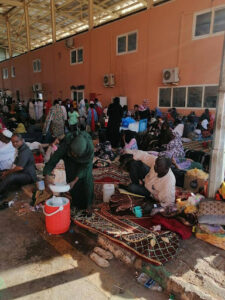
Travelers sleep on the ground at the Arqeen border crossing while they wait for their documents to be processed and permission to cross. (Image Source: Witnesses among those stranded at the Arqeen border crossing).
Hasnaa, who was stranded at the Arqeen crossing with her family from May 24th until June 2nd, before returning to the state of Dongola (the nearest state to the Arqeen crossing), said that the Egyptian authorities issued a decision on May 24th to halt the processing of the temporary document that allowed holders of expired documents to cross. Sudanese authorities had been extending these documents, which allowed the passage of women, children, and men over fifty since the beginning of the conflict until the date of the decision, which was issued under the pretext of a young man, over 16, having forged his documents, as circulated.
Hasnaa spoke to RPE about the impact the decision had on her: “We – my siblings, my mother, and I – have been here at the Arqeen crossing since May 24th. The situation at the Arqeen crossing is extremely difficult. We were not allowed to cross. My mother has a passport, while my sisters and I have temporary travel documents, therefore, we were denied entry. We came to Arqeen because travel documents were valid until the 24th, the day of our arrival.”
She elaborates on the humanitarian situation thousands of Sudanese citizens have been facing at the Arqeen crossing since May 24th, stating, “Thousands of patients and elderly individuals suffer from chronic conditions such as diabetes, hypertension, heart diseases, and paralysis. Despite the long journey these individuals have undertaken, the denial of entry to holders of temporary documents has affected thousands of women, children, infants, births, and the elderly. The situation in Arqeen is extremely difficult, with water unfit for drinking, performing Wuḍū, or even bathing, as it is highly contaminated and causes cases of diarrhea among children and the elderly.”
Hasnaa continues: “The majority of the elderly suffer from poor psychological conditions due to the denial of entry and the inability to return, leading to frustration. Most of them experience fluctuations in blood pressure and blood sugar levels. There is no medication or medical supplies available at the medical unit. Many elderly individuals have passed away, and we have cases of premature childbirth at the crossing.”
“The elderly and children sleep on the ground. Additionally, many have lost their identification papers due to the overcrowding, with replacements being difficult to obtain. It has become challenging to return to our states because there is no medication, treatment, or healthcare services available. There are power outages from 5:00 till 11:00, which is when work begins. We rejoice when there is cold water or ice.”
“One of the extremely heartbreaking cases is a girl accompanying her mother, who suffers from memory loss, and her father, who is visually impaired, yet they were denied entry. People with chronic illnesses arrive at the Egyptian crossing inside ambulances but are sent back because of the documents. Another girl, afflicted with a mental illness, started assaulting everyone due to lack of treatment; she even attacked her sister, biting her until she was covered in blood. And another mentally ill young man, whose mother is elderly, left without returning, stripping off his clothes, and was denied entry at the Egyptian gate,” recounts Hasnaa.
“Thousands upon thousands endure similar situations, including mothers with sick children. The food is rotten meat heels, fava beans, and lentils in very limited quantities, insufficient for everyone. People are living on the streets, and most of them are elderly,” adds Hasnaa.
Furthermore, there have been “18 deaths, and those who pass away are buried in ambulances in the state of Dongola. There were two childbirth cases, but they managed to enter through the Egyptian crossing after giving birth. There’s a clinic in the area run by Sudanese citizens, but its condition is extremely poor,” concludes Hasnaa.
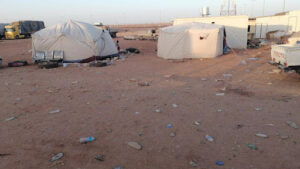
Image of health tent at Arqeen crossing. (Image source: Witnesses among those stranded at the Arqeen border crossing).
Commenting on the document situation, Ahlam says “In Arqeen, the issue of the document is still unresolved. Nobody can confirm the document is valid. So far, the document is not functional, and we can see the frustration. Isn’t it evident from the protest and the banners? This is a small protest at the Arqeen crossing that took place yesterday afternoon due to the suspension of the document. There are children, women, elderly, and sick individuals in Arqeen who don’t know where to go or what to do. The document is not functioning… The document is not functioning.”

Holders of temporary documents protest the denial of entry. (Image source: Witnesses among those stranded at the Arqeen border crossing).
Hasnaa questions: “Women of all ages were allowed entry from the very beginning, so there was no room for forgery, why are they denied entry then?”
She adds, “The place is extremely dirty, increasing the risk of diseases for people. The place is also unsafe; fires have erupted 3 times in my presence, the last one being today – May 24th – near a gasoline tank, which could lead to a mass annihilation if it explodes.”
Ahlam also mentions that “There was a massive fire; a fire truck came from the Egyptian border and returned twice to bring water to extinguish the fire. We don’t know what caused the fire or the extent of the damage. May God protect everyone.”

Image of fire on Sudanese side of Arqeen border crossing, May 26th, 2023. (Image source: Witnesses among those stranded at the Arqeen border crossing).
Hasnaa says: “The weather is extremely harsh; scorching heat during the day and freezing cold at night, causing everyone infections. Many citizens have lost hope and returned to Khartoum to face death. The water is contaminated and the well water is salty. The food is extremely expensive. There are biscuits, drinkable water, and soft drinks, but they are all very expensive at astronomical prices. Milk and cake are also available but incredibly expensive. All of this is but a drop in the ocean of what’s happening at the Arqeen border, with many stories and tragedies.”
“We call on the Egyptian government to solace the problem because everyone is dying slowly. There is no hope of returning to Khartoum anymore. The clashes are frequent and terrifying, in addition to looting, rape, and merciless killing of innocent civilians.”

Image of drinking water on Sudanese side of Arqeen border crossing. (Image source: Witnesses among those stranded at the Arqeen border crossing).
Ahlam recounts her experience at the border: “Yesterday at the Egyptian side of the border crossing, it took us less than an hour, Alhamdulillah (thank God), they are fast and treat us well. However, at the Sudanese side of the crossing, it took us 3 days, sleeping on the bus in the heat and the foul smell. Why are we like this? Why are we not organized? Why is our border crossing in this condition? Why do people sleep next to filth? Why isn’t it clean? Even if they increase the procedures’ fees and bring in a cleaning company, wouldn’t that be better? The war has been going on for over a month, why haven’t they expanded and opened more gates? Why haven’t they brought in passport and customs officers from Khartoum? We need bathrooms, cafeterias, grocery stores, hospitals, pharmacies, and tents with mattresses.”
Despite the conflict lasting for over 40 days, there is a lack of international and relief organizations at the Arqeen border crossing on the Sudanese side. Meanwhile, the United Nations High Commissioner for Refugees stated during his visit to Egypt: “The UNHCR is trying to be present on the Sudanese side of the border, and we are looking for a way for those who have lost their passports to cross into Egypt.'”
